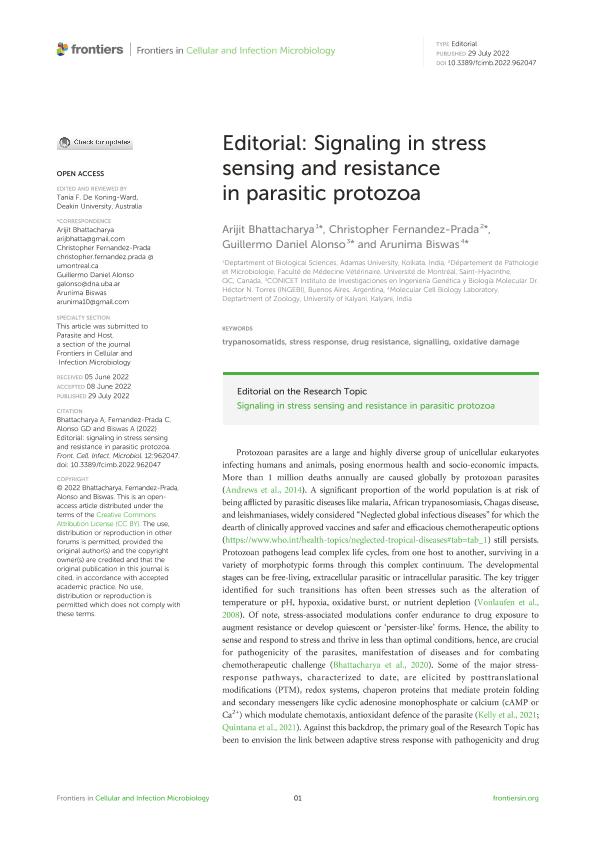Mostrar el registro sencillo del ítem
dc.contributor.author
Bhattacharya, Arijit
dc.contributor.author
Fernandez Prada, Christopher
dc.contributor.author
Alonso, Guillermo Daniel

dc.contributor.author
Biswas, Arunima
dc.date.available
2023-06-26T11:39:26Z
dc.date.issued
2022-07
dc.identifier.citation
Bhattacharya, Arijit; Fernandez Prada, Christopher; Alonso, Guillermo Daniel; Biswas, Arunima; Editorial: Signaling in stress sensing and resistance in parasitic protozoa; Frontiers Media; Frontiers in Cellular and Infection Microbiology; 12; 7-2022; 1-4
dc.identifier.uri
http://hdl.handle.net/11336/201422
dc.description.abstract
Protozoan parasites are a large and highly diverse group of unicellular eukaryotes infecting humans and animals, posing enormous health and socio-economic impacts. More than 1 million deaths annually are caused globally by protozoan parasites (Andrews et al., 2014). A significant proportion of the world population is at risk of being afflicted by parasitic diseases like malaria, African trypanosomiasis, Chagas disease, and leishmaniases, widely considered “Neglected global infectious diseases” for which the dearth of clinically approved vaccines and safer and efficacious chemotherapeutic options (https://www.who.int/health-topics/neglected-tropical-diseases#tab=tab_1) still persists. Protozoan pathogens lead complex life cycles, from one host to another, surviving in a variety of morphotypic forms through this complex continuum. The developmental stages can be free-living, extracellular parasitic or intracellular parasitic. The key trigger identified for such transitions has often been stresses such as the alteration of temperature or pH, hypoxia, oxidative burst, or nutrient depletion (Vonlaufen et al., 2008). Of note, stress-associated modulations confer endurance to drug exposure to augment resistance or develop quiescent or ‘persister-like’ forms. Hence, the ability to sense and respond to stress and thrive in less than optimal conditions, hence, are crucial for pathogenicity of the parasites, manifestation of diseases and for combating chemotherapeutic challenge (Bhattacharya et al., 2020). Some of the major stress-response pathways, characterized to date, are elicited by posttranslational modifications (PTM), redox systems, chaperon proteins that mediate protein folding and secondary messengers like cyclic adenosine monophosphate or calcium (cAMP or Ca2+) which modulate chemotaxis, antioxidant defence of the parasite (Kelly et al., 2021; Quintana et al., 2021). Against this backdrop, the primary goal of the Research Topic has been to envision the link between adaptive stress response with pathogenicity and drug response. With three original articles, the Research Topic offers a glance hinting towards the significance of PTM in oxidative stress response in T. cruzi, alteration of membrane dynamics in drug resistance in L. donovani, and development of a potential nanoformulation inducting hallmarks of stress response in L. donovani. Alongside this, an illustrative review highlights a putative trypanosmatid G-protein coupled receptor signaling in a sensing host environment.
dc.format
application/pdf
dc.language.iso
eng
dc.publisher
Frontiers Media

dc.rights
info:eu-repo/semantics/openAccess
dc.rights.uri
https://creativecommons.org/licenses/by/2.5/ar/
dc.subject
DRUG RESISTANCE
dc.subject
OXIDATIVE DAMAGE
dc.subject
SIGNALLING
dc.subject
STRESS RESPONSE
dc.subject
TRYPANOSOMATIDS
dc.subject.classification
Bioquímica y Biología Molecular

dc.subject.classification
Ciencias Biológicas

dc.subject.classification
CIENCIAS NATURALES Y EXACTAS

dc.title
Editorial: Signaling in stress sensing and resistance in parasitic protozoa
dc.type
info:eu-repo/semantics/article
dc.type
info:ar-repo/semantics/artículo
dc.type
info:eu-repo/semantics/publishedVersion
dc.date.updated
2023-06-22T10:22:27Z
dc.identifier.eissn
2235-2988
dc.journal.volume
12
dc.journal.pagination
1-4
dc.journal.pais
Suiza

dc.journal.ciudad
Lausana
dc.description.fil
Fil: Bhattacharya, Arijit. Adamas University; India
dc.description.fil
Fil: Fernandez Prada, Christopher. University of Montreal; Canadá
dc.description.fil
Fil: Alonso, Guillermo Daniel. Consejo Nacional de Investigaciones Científicas y Técnicas. Instituto de Investigaciones en Ingeniería Genética y Biología Molecular "Dr. Héctor N. Torres"; Argentina
dc.description.fil
Fil: Biswas, Arunima. University Of Kalyani; India
dc.journal.title
Frontiers in Cellular and Infection Microbiology
dc.relation.alternativeid
info:eu-repo/semantics/altIdentifier/doi/http://dx.doi.org/10.3389/fcimb.2022.962047
dc.relation.alternativeid
info:eu-repo/semantics/altIdentifier/url/https://www.frontiersin.org/articles/10.3389/fcimb.2022.962047/full
Archivos asociados
